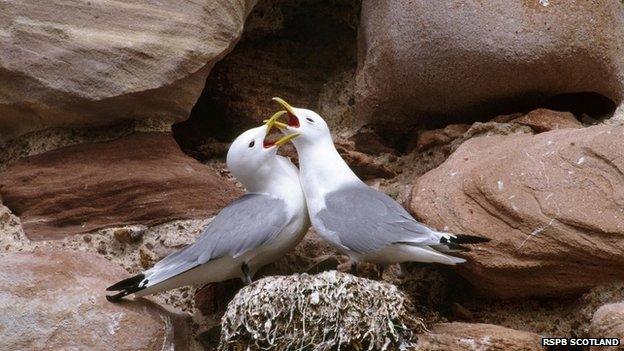Scottish seabird colonies decimated by coldest spring in 50 years
- Published

Kittiwake colonies are down by as much as 87%
Seabird colonies in Scotland have been decimated because of bad weather earlier this year.
The coldest spring in more than 50 years has taken its toll and early monitoring has indicated counts are down by up to 87%.
Now RSPB Scotland has called on the Scottish government to take action.
It wants ministers to designate Marine Protected Areas (MPAs) for seabirds and the sandeels they feed on.
RSPB research has revealed that adult birds have arrived late for the breeding season and in poor condition.
'Scary' numbers
Doug Gilbert, head of reserves ecology for RSPB Scotland, said: "The numbers so far are really scary."
The harsh weather earlier in the year has added to the long-term challenges seabirds are facing, including lack of food due to the impact of climate change on the marine food chain and poor management of human activities in the marine environment.
Colony counts on RSPB Scotland reserves across the country from the Northern Isles of Orkney and Shetland to the Firth of Clyde, reveal a similar picture.
Species like kittiwakes, guillemots and razorbills are showing some of the steepest declines in numbers of birds present.
Seabird counts on some sites around Orkney indicate an 87% reduction in the number of kittiwakes compared with counts conducted on the same sites as part of the last seabird census in 2000.
Razorbills are down 57% from a total of 2,228 in 2000 to just 966 in 2013.
Guillemots have declined by 46% during the same period.
Meanwhile, seabird counts on Ailsa Craig in the Firth of Clyde also suggest a poor season for species like guillemot, razorbill and kittiwakes, with the latter declining by 70% since 2000.
Mr Gilbert said: "Orkney again is being hit badly, as it was last year. Although this may just be a temporary effect because of the bad spring weather, the underlining trend for many years now has been downward.
"The late season will certainly not help in the race to turn the fortunes of seabirds around before it is too late. There are exceptions such as puffin numbers on the Isle of May but even here, many birds are reported as being in poor condition and unlikely to breed successfully".
Declining population
Allan Whyte, RSPB Scotland marine policy officer, said: "There is every sign that this will be another difficult year for some of our most recognisable seabirds including guillemots, razorbills and kittiwakes.
"These results should send a clear message to the Scottish government that they must designate Marine Protected Areas for seabirds, and the sandeels they feed on, to give them a fighting chance.
"Giving seabirds the protection they deserve can help boost resilience in their declining population and allow them to recover after many poor breeding seasons."
Last year figures from Scottish National Heritage revealed that from 1986 to 2011 the number of seabirds breeding in Scotland had dropped by about 53%.
Of the 11 species reviewed over the 25-year period, the numbers of nine decreased. The largest declines were for the Arctic skua (74%), Arctic tern (72%) and black-legged kittiwake (66%).
Two seabirds, the black guillemot and northern fulmar, have remained stable.
- Published6 November 2012
- Published23 August 2012
- Published27 June 2012
- Published31 October 2011